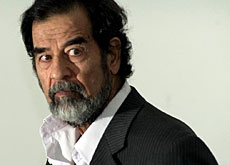Expert raises doubts over Saddam trial

A Swiss legal expert, who declined to defend Saddam Hussein, gives swissinfo his view on the trial of the former Iraqi leader which resumes in Iraq later this month.
Marc Henzelin says it is difficult to have an independent judiciary in Iraq and that the resignation of the chief judge is a serious blow to the proceedings.
The international criminal law specialist was originally approached by Saddam’s wife to take part in the defence team, but he turned the case down over fears it could turn into a show trial.
Saddam and seven other defendants are accused of crimes against humanity in the killing of more than 140 people at Dujail, a small Shi’ite town in northern Iraq, in 1982. They deny the charges.
The high-profile case has been dogged by a number of setbacks. The latest came after chief judge Rizgar Amin resigned earlier this month after complaining of government interference.
He has been replaced by Raouf Abdel Rahman.
The court session which was supposed to open on January 24 has now been put back until January 29.
swissinfo: How has the trial gone so far?
Marc Henzelin: It’s a little bit what I already expected when Saddam Hussein was arrested by the United States, meaning that unfortunately it’s extremely difficult to have an independent judiciary in a country which is torn by war, especially when the case to be judged is that of the former leader.
Last year two defence lawyers were killed and the year before an investigating judge and one prosecutor were killed. The witnesses are afraid to give testimony and a judge has resigned… he claims the government is putting pressure on him and this is totally unacceptable for a judicial power.
swissinfo: How serious a blow is the resignation of the chief judge?
M.H.: It is very serious for two reasons. First, because it is evidence that the government is putting pressure on the judiciary and on the tribunal.
On the other hand, this judge, at least in the media, looked quite decent and quite neutral.
swissinfo: The trial seems to have been full of stops and starts.
M.H.: This doesn’t worry me too much in the sense that it is typical of the system – you cannot have a whole trial for cases which last for months unless everything is really prepared.
[But] it gives a very strange impression that [the court] sits for couple of days and then tries to modify the course of the trial depending on what was said or what was issued during the trial.
swissinfo: So basically it’s a fairly normal way of proceeding in these circumstances?
M.H.: Most experts on international criminal law say the trial must be externalised and made international. It must sit outside of Iraq, away from the pressures, the threats and the current situation.
It’s not possible to sit in a compound defended by a foreign occupying force with a population which does not want to take part in the court for reasons such as security. It really gives the impression that it is being utilised by some actors.
I don’t want to say the Americans are leading the case right now. There are other actors, most probably the Shi’ites who want to get rid of Saddam Hussein. We also know that [neighbouring] Iran is pushing for certain directions and not others.
This is not a trial. A trial has to be neutral, independent and based on law not politics.
swissinfo: Where do you think the trial is heading?
M.H.: I really don’t know. I don’t know if we will end up with a hanging after some more court sessions or if this case will drag on for years until everybody’s fed up.
swissinfo-interview: Isobel Leybold-Johnson
Saddam Hussein took power in Iraq in 1979.
The toppled leader was captured by US forces in 2003.
His trial for crimes against humanity opened on October 19, 2005.
It adjourned on December 22, 2005 and was set to reopen on January 24, 2006.
It was later rescheduled to resume on January 29.
Geneva-based Marc Henzelin turned down the case because he feared it had become a political matter. He was also concerned about security and the lack of coordination in the defence team.
He has said that the special tribunal was not compatible with international law.
Henzelin has been admitted before the International Criminal Tribunal for the former Yugoslavia, International Criminal Tribunal for Rwanda and the International Criminal Court.

In compliance with the JTI standards
More: SWI swissinfo.ch certified by the Journalism Trust Initiative











You can find an overview of ongoing debates with our journalists here . Please join us!
If you want to start a conversation about a topic raised in this article or want to report factual errors, email us at english@swissinfo.ch.